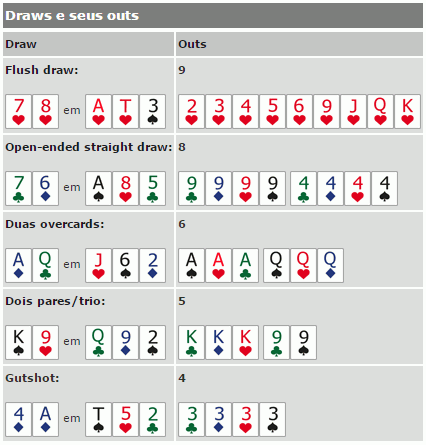Probabilidades Poker Holdem
Pot odds are fixed; there is no actual calculation. However, 'implied odds' should be added in for the most accurate picture. In the scenario above, although your pot odds are 5:1, if there are 2 other people in the hand 'behind' you that haven't acted yet, and they each have $1 in their hand, waiting for you to call so they can call (bad poker etiquette), your implied odds, for just this.
- Probabilidades Poker Holdem Games
- Probabilidades Texas Holdem
- Probabilidades Manos De Poker Texas Holdem
- Welcome to the world of poker. In this video I analyze this game at a mathematical level so that you know before playing some basic concepts and how can be m.
- Essentially, it is a poker simulator for Texas Hold'em that analyzes and summarizes various outcomes. This is a technique called Monte Carlo simulation. This simulation enables us to also analyze the type of opponents' hands that can beat your hand when the shared cards (flop, turn and river) are supplied.
- Using a Poker odds Calculator. Want to know how far ahead or behind you are in a Texas Hold’em hand against one, two or more opponents? Our poker calculator is the perfect medium for finding out the odds in any given situation.

Remember the last time you called with a pair of eights and were raised? Didn't you wonder whether your opponent had a bigger pair, or was simply raising with big connectors? When you're playing Texas Hold'em, you're always dealing odds. 'How many outs do I have?', 'Is the money I'll win if I call with my straight draw greater than the odds against making my hand?' These questions of poker strategy, all have mathematical components at their heart.
Some players are blessed with an intuitive sense about mathematical relationships - although they can't calculate them, or even do a rough approximation in the heat of battle. Most beginners, however, simply ignore this aspect of the game. Given the chance, even bright students are prone to avoiding mathematics, which is a shame because poker math is far from being difficult.
How Many Hands Are Rightfully Mine?
This is not a question that's asked frequently, but when you consider how many hands you should play before the flop, it's an important one for mastering your poker game. In a nine-handed game with randomly distributed cards, approximately 11% of the starting hands should favor you. That's simple, isn't it? But remember, that's not all there is to it, either. Hold'em, after all, is a game of position, and you'll probably play less than 11% of your hands in early position, and far more than 11% when you're last to act. Whether calling, folding, raising, or reraising, is your best option will also be influenced by the play of those opponents who act before you.

Try These Practice Exercises
How do you calculate the number of different two-card starting combinations that could be dealt?
There are 169 unique, two-card starting hands. Here's how to compute it. You can receive any one of 13 distinct ranks, from ace up through king, as your first or second card. All you need do, therefore, is multiply thirteen by thirteen to calculate the correct answer.
Although there are 169 different starting hands, it's also true that there are 1326 different two-card combinations. If you feel lost at this point, stop for a moment and let us explain. When you're considering 169 different starting hands, you have yet to see the flop, and it's meaningless at this early juncture to distinguish between hands like A♥Q♥ and A♣A♦
When you're considering the odds against certain combinations of holdings, it's usually necessary to deal with all of the 1326 different 2-card combinations. Here's why.
Suppose that the guy sitting next to you will raise only with aces, kings, or A-K. If you're holding a pair of queens, what are the chances you're already trailing?
Although the arithmetic isn't difficult, there are a number of components to this problem. The only hands better than a pair of queens at this point are a pair of aces or a pair of kings. Queens, after all, are stronger than A-K right now, since A-K has to improve on or after the flop in order to beat you. To solve Exercise 2, there are two additional problems you have to work out before you continue…
How many different ways can you make a pair of aces or a pair of kings? How many ways can you make A-K?
There are only six ways to make aces - or any pair for that matter - but 16 ways to make A-K. Here are all the possible ways to make a pair of aces: A♠A♦, A♠A♣, A♠A♥, A♦A♣, A♦A♥, and A♥A♣. Just take the aces from any deck of cards and you'll be able to figure this out even if you don't know how to calculate the answer arithmetically.
If your opponent will raise only with A-K, a pair of aces, or a pair of kings, chances are greater that he raised with A-K, since there are 16 ways to make A-K but only 12 ways to make a pair of aces or a pair of kings!
Probabilidades Poker Holdem Games
You can do some other useful calculations with what you've learned thus far. For example, since there are 1326 possible 2-card combinations, but only six ways to make aces, try your hand at this problem.
What are the odds against being dealt a pair of aces before the flop?
Probabilidades Texas Holdem
All you have to do is divide 1,326 (the amount of 2-card combinations) by 6 (the potential amount of ace pairs) to figure this out. The answer, of course, is that you'll receive aces, on average, once every 221 hands.